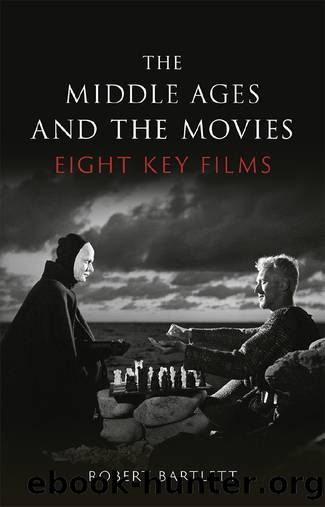The Middle Ages and the Movies by Robert Bartlett

Author:Robert Bartlett
Language: eng
Format: epub
Publisher: Reaktion Books
Urraca and King Alfonso, who have spurned El Cid and the Muslim kings he brings as allies.
The critical turning point in Alfonsoâs development is the moment that the Cidâs loyal servant Fáñez brings the crown of Valencia to Alfonso and Urraca. The king cannot believe this gesture. Urraca rejects Fáñezâs plea to bring help to the Cid and, kneeling in front of her brother, holds out the crown to him. âLook,â she says, ânow you are also king of Valencia.â âI am king of nothing!â, he replies, brutally knocking her to the floor. Dashing out, he cries, âI will make myself a king!â Urraca is left alone in the empty chamber. The next time we see Alfonso, more than twenty minutes later, he is leading his troops into Valencia to bring help to the dying Cid. In the last minutes of the film, as the Cidâs dead body leads the charge out of Valencia, Alfonso is on one side, Moutamin on the other. Alfonsoâs rejection of dependence on his sister is accompanied by this conversion to multiculturalism. His masculine independence and his status as the nationâs leader have both been vindicated. Incidentally, John Fraser, who played Alfonso, gave in his autobiography, Close Up (2004), a frank (and very well written) account of what it was like to be a homosexual working in the film industry when open acknowledgement of his sexuality would have meant damage to, perhaps even the end of, his career.
After El Cid has freed Alfonso by defeating thirteen of Sanchoâs men, who are escorting him to prison, Alfonso looks at him in amazement. âWhat kind of man are you?â, he asks. Later, when El Cid sends him the crown of Valencia, he again asks, âWhat kind of man is this?â This is the question, isnât it? He is the kind of man who will fight for his familyâs honour, who can love a woman deeply, who is never underhand, who believes that differences of religion are not important when it comes to love of oneâs country. Writing his autobiography more than thirty years after the film was made, Charlton Heston described El Cid âdriving the Moors out of Spainâ, which, if by âMoorsâ he means Spanish Muslims, was exactly what the film shows him not doing. This formulation, which was only given as a casual aside, probably reflects less the actorâs well-known shift to the conservative wing of politics than the natural human tendency to revert to simplistic cliché in preference for complex analysis (the respected film critic David Thomson, writing in 2008, also called El Cid âthe Spanish warrior heroâ who âhad cleared the Moors out of Spain in the eleventh centuryâ).
In the first minutes of El Cid we are told that our hero is a man who ârose above religious hatreds and called upon all Spaniards, whether Christian or Moor, to face a common enemyâ. How differently such a subject could be treated is shown by a film that was made a year or two
Download
This site does not store any files on its server. We only index and link to content provided by other sites. Please contact the content providers to delete copyright contents if any and email us, we'll remove relevant links or contents immediately.
| Ancient & Classical | Anthologies |
| British & Irish | Children's |
| Comedy | LGBT |
| Medieval | Regional & Cultural |
| Religious & Liturgical | Shakespeare |
| Tragedy | United States |
| Women Authors |
Cecilia; Or, Memoirs of an Heiress — Volume 3 by Fanny Burney(30961)
Cecilia; Or, Memoirs of an Heiress — Volume 2 by Fanny Burney(30918)
Dialogue by Robert McKee(3601)
The 101 Dalmatians by Dodie Smith(2950)
Bound by Hatred (The Singham Bloodlines Book 2) by MV Kasi(2698)
Harry Potter and the Cursed Child - Parts One and Two by John Tiffany(2585)
The Beautiful Boys: A High School NA Reverse Harem Paranormal Bully Romance (Shadowlight Academy Book 1) by Gow Kailin(2506)
The Art of Dramatic Writing: Its Basis in the Creative Interpretation of Human Motives by Egri Lajos(2425)
Carrie's War by Nina Bawden(2110)
Angels in America by Tony Kushner(2057)
Unlaced by Jaci Burton & Jasmine Haynes & Joey W. Hill & Denise Rossetti(2031)
A Clockwork Orange by Anthony Burgess(1951)
The Femme Playlist & I Cannot Lie to the Stars That Made Me by Catherine Hernandez(1897)
Drama by John Lithgow(1890)
Open Book by Jessica Simpson(1801)
Outside Woman (BWWM Amish Romance) by Stacy-Deanne(1743)
Terrorist Cop by Mordecai Dzikansky & ROBERT SLATER(1725)
Yerma by Federico García Lorca(1651)
Leo's Desire by Sundari Venkatraman(1600)
